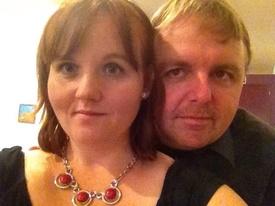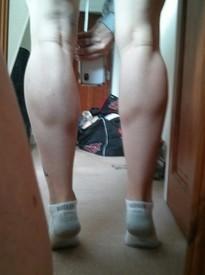TDEE according to online calculators feels low

tomatoey
Posts: 5,446 Member
I've been setting my calorie targets at a level higher than TDEE - 10%, and doing it according to what feels good to me instead. I have my net at 1600, but 2000 feels better.
-
I can't get my head around the low TDEE the calculators give me, using all formulas. For example: I put in my height and the weight I maintained for 4 years (124 lbs, up until recently). The calculators gave me a TDEE of 1874, with 4 days of exercise a week. Except, I ate at 2000-2400 for most of those four years (gained weight when I fell completely off the wagon after injuries, it was not the cumulative result of eating that amount.) I lost at 1800-2200.
Also, my weight was stable at 143 for the past year, with sedentary-light activity. I'm pretty sure that I must have been eating ~2400 before getting back on the wagon (because even though I'm eating a lot, I'm eating less than I was, at least a good filling snack's worth). The calculators, however, give me 1940 with 4 days of exercise for 143 lbs, and 1641 for sedentary (!!!!) - that's super low!
I don't think I can eat less than 2000, but I also can't do activity as intensely or long as I did in the past, so I'm trying to figure out where to peg it. I know the answer is, log and see what happens and eat less if not losing.
Does anyone else seem to have a higher TDEE than the calculators suggest?
-
I can't get my head around the low TDEE the calculators give me, using all formulas. For example: I put in my height and the weight I maintained for 4 years (124 lbs, up until recently). The calculators gave me a TDEE of 1874, with 4 days of exercise a week. Except, I ate at 2000-2400 for most of those four years (gained weight when I fell completely off the wagon after injuries, it was not the cumulative result of eating that amount.) I lost at 1800-2200.
Also, my weight was stable at 143 for the past year, with sedentary-light activity. I'm pretty sure that I must have been eating ~2400 before getting back on the wagon (because even though I'm eating a lot, I'm eating less than I was, at least a good filling snack's worth). The calculators, however, give me 1940 with 4 days of exercise for 143 lbs, and 1641 for sedentary (!!!!) - that's super low!
I don't think I can eat less than 2000, but I also can't do activity as intensely or long as I did in the past, so I'm trying to figure out where to peg it. I know the answer is, log and see what happens and eat less if not losing.
Does anyone else seem to have a higher TDEE than the calculators suggest?
0
Replies
-
Try IIFYM calculator
 0
0 -
I did!0
-
Sorry, no that's a different one
 It is a little higher, and I think closer to reality
It is a little higher, and I think closer to reality  0
0 -
Calculators can only work on generalities - and so TDEE may be higher or lower according to you. I can eat about 200 calories above what a calculator says and I figured that out by trying to find my TDEE. If you already have a calorie amount with which your body has been happily maintaining then THAT is your TDEE and no calculator will be able to tell you better.0
-
Only a few possibilities: 1. Your TDEE really is higher than average; 2. You're eating more than you think; 3. Your activity and exercise is higher than the calculator assumes for your reported level. You can test #2 by careful measuring, if you're not. If you're confident your calories are right, you can sort of test #2 by upping your exercise and activity level in the calculator and see if your TDEE is then consistent with what you believe. But ultimately your TDEE is what it is; the scale doesn't lie.0
-
Yes! Funnily enough I have just been looking at calculators this morning because of this. I stopped exercising (weights/running) back in Oct, so I tried using a combination of scooby and IIFYM TDEEs for sedentary/couch potato (which has certainly been the correct activity level since mid December!). They both have me 1480 or something which I felt was too low, so I set at 1580 as a compromise. I have consistently lost weight at 1580 calories a day - 4lb in 3 months in fact. Even this week when I really have been sedentary, I've lost 1lb. I don't want to lose any more weight so I am going to try 1700 per day - way over what the calculators say I need for my activity level.
I am 5ft 4 and 118 lb by the way.0 -
The older and shorter you are, the lower your tdee is.
My tdee is only 1732, with exercise set at 4 times per week.10% of that is 1553. The more weight I lose the lower my tdee goes and the less I can eat to lose.
It's just how it goes. I'm assuming you are shorter than average like me, thus the lower tdee.
If you want to eat more, try 10% of your tdee. Yes you'll lose at a slower rate, but you will be able to eat more.0 -
higgins8283801 wrote: »The older and shorter you are, the lower your tdee is.
No this is not correct. TDEE has nothing to do with age or height! It's the amount of activity a person does, how much they are burning through exercise, neat activity etc. You could be 5 foot and be an extremely active 50 year old and have a high TDEE.
0 -
If you know you lost at 1800-2200, then eat at this to lose. Calculators are just guesstimates, everyone is different and you often have to play with the numbers.0
-
higgins8283801 wrote: »The older and shorter you are, the lower your tdee is.
No this is not correct. TDEE has nothing to do with age or height! It's the amount of activity a person does, how much they are burning through exercise, neat activity etc. You could be 5 foot and be an extremely active 50 year old and have a high TDEE.
No, it is correct. As you age, you burn fewer calories for a given activity level. That's why age is an input into any TDEE calculator. They're not just curious.0 -
higgins8283801 wrote: »The older and shorter you are, the lower your tdee is.
My tdee is only 1732, with exercise set at 4 times per week.10% of that is 1553. The more weight I lose the lower my tdee goes and the less I can eat to lose.
It's just how it goes. I'm assuming you are shorter than average like me, thus the lower tdee.
If you want to eat more, try 10% of your tdee. Yes you'll lose at a slower rate, but you will be able to eat more.
I think you might be confusing RMR with TDEE. If you eat at too high a defecit for too long then yes your rmr will drop.
When I started in August the first couple of months I was eating low 1800's to lose weight, then for the next couple of months I was able to eat low 1900's and kept on losing (with same activity level) The last few weeks my average has gone up even more to the high 1900's and I continue to lose! It's great how I can up my calories like the way i have been and keep losing. Most people usually lower their calories when they weigh less as they can't lose any other way. What this does is run your metabolism into the ground and then when you have lost all the weight you wanted to lose you will have to eat at a lower maintenance amount due to your rmr having been lowered.
To the OP, take those calculators with a grain of salt. For the next 4 weeks log everything strictly ensuring you measure etc and work out your TDEE that way, and then take a percentage cut off of that. The trick to losing is to be able to eat the most you can and still lose weight. It doesn't matter if you lose a little slower. You'll keep your metabolism firing and retain your muscle mass. You'll also have heaps of energy to work on fitness. You don't want to cut at too large a defecit as you'll have no where to go if you plateaue plus you'll fu&k up you rmr.
0 -
higgins8283801 wrote: »The older and shorter you are, the lower your tdee is.
My tdee is only 1732, with exercise set at 4 times per week.10% of that is 1553. The more weight I lose the lower my tdee goes and the less I can eat to lose.
It's just how it goes. I'm assuming you are shorter than average like me, thus the lower tdee.
If you want to eat more, try 10% of your tdee. Yes you'll lose at a slower rate, but you will be able to eat more.
I think you might be confusing RMR with TDEE. If you eat at too high a defecit for too long then yes your rmr will drop.
When I started in August the first couple of months I was eating low 1800's to lose weight, then for the next couple of months I was able to eat low 1900's and kept on losing (with same activity level) The last few weeks my average has gone up even more to the high 1900's and I continue to lose! It's great how I can up my calories like the way i have been and keep losing. Most people usually lower their calories when they weigh less as they can't lose any other way. What this does is run your metabolism into the ground and then when you have lost all the weight you wanted to lose you will have to eat at a lower maintenance amount due to your rmr having been lowered.
To the OP, take those calculators with a grain of salt. For the next 4 weeks log everything strictly ensuring you measure etc and work out your TDEE that way, and then take a percentage cut off of that. The trick to losing is to be able to eat the most you can and still lose weight. It doesn't matter if you lose a little slower. You'll keep your metabolism firing and retain your muscle mass. You'll also have heaps of energy to work on fitness. You don't want to cut at too large a defecit as you'll have no where to go if you plateaue plus you'll fu&k up you rmr.
No, if she's older and short that's not BMR or RMR, and it's probably a basic estimate, nothing to do with under-eating. I'm 5'3 and 45, and with 4 days of exercise on the IIFYM site I get BMR of 1205, TDEE of 1710 with Mifflin-St Jeor and (using an estimated BF) 1289 and 1829 with Katch-McCardle.
For me, though, that's low, as I do more than 4 days of exercise per week and--perhaps to go to the OP's point--lose at a rate higher than the calculators at IIFYM suggest (or did until I got derailed by the holidays), which I think is because they don't do a good job of adjusting for exercise length or intensity. I workout 5-6 days per week, but often quite intensely or for longer periods of time (training runs for a half marathon), so lost beyond what the predicted 2000 TDEE would indicate.
OP, the calculators are just estimates, so if you think a particular number is appropriate try it and then adjust down if you aren't losing as hoped. Ultimately you should be able to ignore the calculators and calculate your own TDEE from your numbers and results.0 -
higgins8283801 wrote: »The older and shorter you are, the lower your tdee is.
No this is not correct. TDEE has nothing to do with age or height! It's the amount of activity a person does, how much they are burning through exercise, neat activity etc. You could be 5 foot and be an extremely active 50 year old and have a high TDEE.
It's both. TDEE is BMR plus activity, but BMR is lower if you are smaller or have less muscle mass, which affects TDEE, and being smaller means that activity burns fewer calories, all else equal. You can still make up for that if you increase activity, but it's still true that with the same activity level a smaller person (and older, because on average older people have less muscle mass, although you can correct for that if you work at preserving it) will have lower TDEEs.
0 -
Right....they just ask you to enter that stuff in because it has nothing to do with the algorithms it uses to calculate TDEE. Age and height do affect TDEE. On days I only get up to use the bathroom my fitbit estimates about 1900-2000 calorie burn and the calculator estimates 2100 for my TDEE, so I would say the are decently close. I have tested them both against my treadmill, motoactv and polar hrm simultaneously. The motoactv is inaccurate. The algorithms it uses are only based on activities you put in, not on heart rate or accelerometer readings. I would say try eating around 2000 for a while and see how you body responds, then drop calories by 100 each week and add in a little bit of walking. I seem to loose weight eating what is supposed to be my TDEE maintenance amount.higgins8283801 wrote: »The older and shorter you are, the lower your tdee is.
No this is not correct. TDEE has nothing to do with age or height! It's the amount of activity a person does, how much they are burning through exercise, neat activity etc. You could be 5 foot and be an extremely active 50 year old and have a high TDEE.0 -
It's just an estimate. If you have more muscle mass, you'll burn more. From what I've seen in the last few months, my TDEE is a bit higher than what the calculators tell me, but not by a lot (100ish).
Or you could be overestimating how much you eat or underestimating your activity level too.0 -
Lissa_Kaye wrote: »
Right....they just ask you to enter that stuff in because it has nothing to do with the algorithms it uses to calculate TDEE. Age and height do affect TDEE. On days I only get up to use the bathroom my fitbit estimates about 1900-2000 calorie burn and the calculator estimates 2100 for my TDEE, so I would say the are decently close. I have tested them both against my treadmill, motoactv and polar hrm simultaneously. The motoactv is inaccurate. The algorithms it uses are only based on activities you put in, not on heart rate or accelerometer readings. I would say try eating around 2000 for a while and see how you body responds, then drop calories by 100 each week and add in a little bit of walking. I seem to loose weight eating what is supposed to be my TDEE maintenance amount.higgins8283801 wrote: »The older and shorter you are, the lower your tdee is.
No this is not correct. TDEE has nothing to do with age or height! It's the amount of activity a person does, how much they are burning through exercise, neat activity etc. You could be 5 foot and be an extremely active 50 year old and have a high TDEE.
Height and age really don't affect one's TDEE by a significant amount. Being very young means having higher energy needs than someone middle aged, and when you're an older adult you might not need to eat as much as someone middle aged. But this mostly has to do with muscle mass, overall weight, and overall activity level. I've entered in my stats before and changed my height and age and the only time it affected the results were when I put myself as under 5' tall (I think? or it didn't affect it at all) or when I said I was under 18.
So on average, when much older and much shorter (shortness would likely also mean an overall lower body weight), there may be lower energy needs. But there also may not be. Overall activity levels and muscle mass will be far more important in determining one's energy needs than will be age or height.0 -
You don't have to keep decreasing your calories to lose weight. I used to eat 1500 calories to lose weight and now I eat 2200-2500 to lose it. I've increased it slowly over-time. I lost 90lbs from pregnancy and then upped my cals slowly. I expected to start gaining weight but I actually kept losing it. As long as I pound myself into the ground with lifting heavy at the gym 5-6 days per week I still drop body fat and increase my strength. It's a very slow process now, but I'm at that point where most people would be maintaining anyway. I can't cut calories because I get sick and my workouts start to suck. So I've just decided to listen to my body and eat more if I'm hungry...and that allows me to really get in a better workout.0
-
Great thoughts everyone - thank you!
I don't know why I'm burning higher, if I am, because I don't currently have a lot of muscle mass. I think my calorie/portion measurements are reasonably accurate. Individual differences, I guess. (I'm 5'7 for whatever that's worth. Also, I punched in my age now and the age from 4 years ago - the difference was 40-50 calories.)
Anyway - I'll follow the advice to figure out my actual TDEE and then try to cut by 100-200 ish, and will see what happens.
Thanks!0 -
I'm 5"8, 42 and 140lbs. The average tdee I get is 1300ish calories. It's depressing
 0
0 -
I just used the IIFYM calculator, and it said 1600 calories. A bit better than the 1300's0
-
christinev297 wrote: »I'm 5"8, 42 and 140lbs. The average tdee I get is 1300ish calories. It's depressing

My goal is 140-145, even without exercise included my goal is never estimated that low. You sure you're not looking at the BMR? My BMR is lower now that I'm lighter. Or are you looking at your caloric needs for losing weight? 1600 would make more sense in that case.0 -
Did not read all the replies..
TDEE calculators are just that ..calculators and there is no way they will be 100% accurate for everyone..
what you need to do is take the number it gives you and eat to that number and see what happens and then based on feedback you get from the scale adjust up or down based on what your goals are.0 -
christinev297 wrote: »I'm 5"8, 42 and 140lbs. The average tdee I get is 1300ish calories. It's depressing

My goal is 140-145, even without exercise included my goal is never estimated that low. You sure you're not looking at the BMR? My BMR is lower now that I'm lighter. Or are you looking at your caloric needs for losing weight? 1600 would make more sense in that case.
yeah most of them was to lose weight. IIFYM was set to maintain. ... I think.
0 -
This is solid advice for novices. I did have a break, but I counted for four years immediately prior to the break. Right now, I'm eating about 2000 on average. I know for a fact that I am eating less than I was before I resumed counting. I am not having the extra croissant, or ice cream. Or French fries, or half a medium pepperoni, bacon and sausage pizza for dinner, as I did during the break. It's a fair estimate (by someone with experience in counting and estimating) that in that time, I was averaging at least 200, probably closer to 400 more than I am now.0 -
Did not read all the replies..
TDEE calculators are just that ..calculators and there is no way they will be 100% accurate for everyone..
what you need to do is take the number it gives you and eat to that number and see what happens and then based on feedback you get from the scale adjust up or down based on what your goals are.
Good advice, thanks 0
0 -
christinev297 wrote: »christinev297 wrote: »I'm 5"8, 42 and 140lbs. The average tdee I get is 1300ish calories. It's depressing

My goal is 140-145, even without exercise included my goal is never estimated that low. You sure you're not looking at the BMR? My BMR is lower now that I'm lighter. Or are you looking at your caloric needs for losing weight? 1600 would make more sense in that case.
yeah most of them was to lose weight. IIFYM was set to maintain. ... I think.
With or without exercise included? If you omit the exercise that will definitely make your maintenance TDEE lower, but then when you'd log and eat back exercise calories it would be much more reasonable! If I enter my stats on IIFYM it gives me about 2060 calories to maintain with exercise at 140lbs. Although IIFYM estimates low for me, so it'd probably be closer to 2150-2200. 0 exercise is about 1700 calories. I guess that's one of the best benefits of exercising, you get to eat more 0
0 -
christinev297 wrote: »I just used the IIFYM calculator, and it said 1600 calories. A bit better than the 1300's
Even if you did 0 exercise, your TDEE is above 1600. You might have used the wrong calculator.0 -
OP, you should check out the EM2WL (eat more to weigh less) group here. I'm almost 65, 5'7", workout 5 days a week and easily lose weight at about 1700 plus a couple of non-counting calorie meals a week. I worked out my TDEE by gradually increasing calories until I stopped losing and gained a couple of pounds, mostly from a carb increase, and then worked backwards from that. I haven't had to lower it at all to keep losing weight. I only have about 15 lbs still to lose to reach my goal weight.
When I started I was eating about 1300-1500 and was too hungry to go lower even though I'd lost about 40 lbs so I had to research other ways to keep going.
Good luck and trust your own data!
0 -

This is my tdee calculation. I have a very low tdee when set to work out 4 times a week. For those who didn't believe me. Lol0
This discussion has been closed.
Categories
- All Categories
- 1.4M Health, Wellness and Goals
- 398.2K Introduce Yourself
- 44.7K Getting Started
- 261K Health and Weight Loss
- 176.4K Food and Nutrition
- 47.7K Recipes
- 233K Fitness and Exercise
- 462 Sleep, Mindfulness and Overall Wellness
- 6.5K Goal: Maintaining Weight
- 8.7K Goal: Gaining Weight and Body Building
- 153.5K Motivation and Support
- 8.4K Challenges
- 1.4K Debate Club
- 96.5K Chit-Chat
- 2.6K Fun and Games
- 4.8K MyFitnessPal Information
- 12 News and Announcements
- 21 MyFitnessPal Academy
- 1.6K Feature Suggestions and Ideas
- 3.2K MyFitnessPal Tech Support Questions












